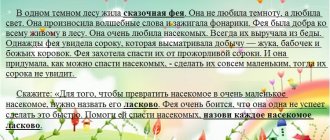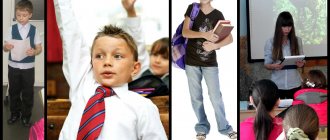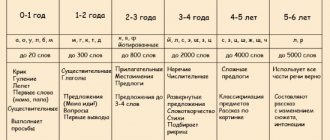How to liberate children, reveal their creative abilities, teach them to communicate with peers without hesitation? One option is to participate in acting training for children, the best exercises of which will be described in detail in this article. You will learn how to conduct classes to develop acting skills, find out what skills each task provides, and how it helps schoolchildren in everyday life. The proposed selection of games teaches teenagers to communicate freely, build interpersonal relationships, relieve tension, manage emotions and understand each other without unnecessary words.
Pump and Ball Game
The improvisation game “Pump and Ball” develops interaction skills.
This exercise is included in most trainings for removing tension; such acting tricks help relieve tension, teach transformation, and concentration.
Practical classes take place in pairs. One of the parents, a presenter or, for example, a classmate can stand opposite the child. No additional equipment is required. The main thing is to correctly understand the task, turn on your imagination and show your creative abilities from the first minutes.
Distribution of roles: one of the participants will be the Pump, the second will be the plastic Ball.
It all starts with the deflated Ball squatting, head bowed and arms down. His posture suggests that the ball is motionless, lifeless, limp. The second player pretends to inflate the Ball with a pump. That, in turn, gradually rises, swells, becomes large and elastic. At the same time, the arms rise, the cheeks puff out, the chest fills with air, the legs become stronger. Simultaneously with physical activity, the Ball participant changes his facial expression, showing emotions of surprise, joy, and pride in himself.
When the Ball is inflated, the Pump proceeds to evaluate the result. He critically examines his work, shakes his head with dissatisfaction, realizing that he has overdone it. The hose “pulls out” and our bloated comrade begins to deflate, gradually returning to its original position. Then the participants in the acting training change roles.
At the end of the lesson you should ask questions:
- What helped you play the role of a ball?
- Was it difficult to transform?
- What did you feel?
- Did your friend help you? How?
- Was it difficult for you to understand what he was going to do next?
- What was your focus?
- Did you see what was happening around you or were you completely focused on completing the task?
- Do you think everything worked out for you?
Let's summarize. Answering questions leads to an understanding of how important it is to be able to concentrate. After all, this exercise was performed without words. Moreover, most often, both sides note that they were not disturbed by either extraneous noise or the emotions of the audience. They cared little about how they looked, whether they looked funny from the outside. The main goal was to get results. Thus, through acting, schoolchildren learn to actively interact, understand each other at a glance, and perform tasks in any, even unfavorable, difficult conditions.
When the role of the Ball was not entirely successful , and the hero was unable to cope with the task of transformation, be sure to note his efforts.
It is important. He also deserves a positive rating! For more reserved guys, this will be the first step towards developing the skill of liberation and interaction.
Moscow Film School
Website: https://moscowfilmschool.ru/ Address: Moscow, Nizhnyaya Syromyatnicheskaya 10, building 2 Phone: +7-495-640-80-14 E-mail: Duration: 2 years Cost: 355,000 rub. per year, payment in installments is possible
In the acting course, you will learn how to work on camera, interact with the film crew, and find a common language with partners and the director. You will be taught to work on the role and script, and feel confident in front of the camera. You will perfectly master the secrets of facial and bodily expressiveness, learn to move correctly and beautifully. Training is conducted in a convenient blended format, allowing you to combine face-to-face and distance learning.
Training program:
Actor's pantomime
The next practical task is aimed at developing non-verbal communication and strengthening team interaction skills.
In most acting trainings, this game is used to liberate and develop facial expressions and gestures. Usually it takes place in a bright emotional atmosphere. Teenagers willingly project funny situations, quickly get carried away, imbued with team spirit and healthy competitive passion. The more active the environment, the better the result.
Learning to show emotions
The pantomime part of acting training takes place in a playful way. Those present are divided into teams of equal size. These two groups will compete with each other. The task of each is to lure as many players from the competing team as possible. As a result, the group with the most people wins.
Pantomime starts with a draw. The team that makes the first move invites any participant from the neighboring team and sets him the task: to depict any object, animal, or person without words. You can use facial expressions, gestures, and any movements, but making sounds is prohibited. When the actor is prepared, he is sent to perform the pantomime to his team. If the team correctly guesses the pantomime number, then the turn goes to it, and now it invites a player from the opposite team. If the answer is incorrect, the pantomime actor is given two more attempts, and if they are unsuccessful, he will automatically become a member of the other team.
Tasks for pantomime can be different. For example, show a chicken, a cat, a teacher, a steam locomotive - whatever your imagination allows. To increase interest and emotional intensity, the task can be complicated. For example, depict a romantic chicken, an angry cat, a strict teacher or a joyful steam locomotive. Of course, it is extremely rare to guess word for word what is hidden. Therefore, you should agree in advance with the participants that they will also count definitions that are similar in meaning. For example, not a strict, but an angry teacher, not a joyful locomotive, but a cheerful train.
Questions at the end of the exercise for both teams:
- Whose pantomime was the easiest to guess? Why?
- What helped you portray animate and inanimate objects?
- Did you root for your team?
- Did you make decisions and choices together?
- Do facial expressions and gestures help you communicate?
- Give examples.
- What role does nonverbal communication play in life, theater, and cinema?
Results. This task forces you to concentrate visual attention on an object, a person, and understand it without words. In theater and cinema this is called acting - the art of conveying the character, mood, and feelings of the hero. And in real life it helps to express your thoughts more clearly or, on the contrary, to restrain emotions and do without words.
Another skill that acting training provides is the skill of teamwork. While performing the exercise, everyone rooted for each other, worried, and strived to work for a common result. This is a playful projection of a society where everyone must learn to feel comfortable and contribute. Exercise has a positive effect on the social adaptation of adolescents.
Exercises for children
For children, the concept of “stage speech” does not yet exist, or rather, it makes no difference whether exercises are performed for the general development of speech or exercises for the development of stage speech for children. The speech apparatus is still fragile and vulnerable; it can easily be damaged by too much stress, and the result of these loads at an early age will be almost unnoticeable. Intensive classes for voice and speech production should begin when the voice is formed and strengthened, i.e. at the age of 16–18 at least. Now it is much more important to give the child’s speech development the right direction. Priority should be given to:
- strengthening the muscles of the tongue and facial muscles;
- production and correct articulation of sounds.
Game "Weather Forecast"
One of the favorite exercises in acting training, “Weather Forecast,” teaches improvisation, group communication, develops expressive speech, and relieves fear of public speaking. Skills necessary not only on stage, but also in life!
For “Weather Forecast” you will need a pre-compiled forecast of weather conditions. It can be fictional, real, with a bit of humor or a fairy tale. Look by age and interests of your audience.
The roles are distributed as follows . Five to seven of the bravest participants will perform on an imaginary stage. The rest of the acting training students take their seats in the auditorium and express their wishes for a change in image, intonation, and manner of reading the weather forecast.
Acting lesson. Exercise - weather forecast
A group of readers will have to convey the character, tempo, specificity of speech, and mood of the imaginary speaker as best as possible. For example:
- TV news journalist;
- sports commentator;
- bus station dispatcher;
- a teacher dictating a text to students;
- speaker at the meeting;
- poor student;
- storyteller;
- policeman, etc.
You can come up with your own, more interesting options.
To complicate the task, speakers are given tasks during the speech. They have to readjust on the fly, get used to the new image of a teacher, storyteller, poor student, etc. Quick switching of attention makes the performance emotional and interesting.
At the same time, the reader is not allowed to lose his thoughts, swallow sounds, or pronounce words unclearly. Speech should remain dynamic and clear. Usually, just a few phrases of stage acting can determine whether an image is a success or not.
The game gives a positive impression to both those who perform and those who sit in the hall.
The children try in every possible way to support their comrades, although their applause is often interrupted by bursts of laughter.
We summarize the results by interviewing weather forecast “speakers”. Questions:
- Did you feel any excitement?
- If yes, when did it pass?
- Was it difficult to get used to other people's characters?
- What worked best?
- Who would you give the highest rating?
- Is it scary to perform again? Why?
What effect does “Weather Forecast” have? Most of the speaker participants are worried at the very beginning, but then note that they are completely immersed in the character and forget about their fears. This experience teaches them to control their emotions and gives them two tools to combat anxiety. The first is good preparation, the second is concentration.
The next positive aspect of this stage of acting training is practicing diction. In improvised, difficult conditions, listeners learn to speak clearly and competently, despite the noise in the hall, the reaction of the audience, and their own excitement. This skill is valued not only in art, but also in everyday life.
Udemy
Website: https://udemy.com Cost: from 999 rub.
ACTING LIFE HACKS Acting and public speaking skills. Working with the camera.
From the director, editor of TNT, REN TV, actor of the theaters named after. Mossovet and Sovremennik, author of the idea for the series Blindspot (Warner Bros. Television), teacher and author of a book on acting, Roman Fedosov.
The course includes a book on acting skills, as well as at least one free, individual online lesson after completing the course.
The course will introduce you to artistic techniques and ways of communicating with the audience: How to cope with anxiety? How do you prepare for shooting? How to attract the viewer's attention and how to control it? Let's talk about the laws of spectator perception. And also - how to find your stage personality and awaken your energy. What is the role of atmosphere in the creative process and how to create it. What is “stage space”, how to fill it and “inhabit it”? How to learn to listen, hear and feel the audience?
What will you learn
- Basics of acting.
- Working on camera.
- Be free and “infectious” on camera.
- Training professional acting attention.
- Create a creative atmosphere.
- Feel, listen and hear the audience.
- Fill and inhabit the stage space.
- Attract and hold the viewer's attention.
- Charismatic and infectious.
- Overcome and manage anxiety.
- Manage your emotions.
- Learn how to find your stage personality.
- Find out what an actor’s “message” is.
- Manage the acting energy.
Sketches with a balloon
The most touching, expressive exercise in acting training is balloon sketches.
They develop plasticity, increase the expressiveness of facial expressions, teach how to transform, express emotions, and build a storyline. Using their imagination, participants prepare small performances with an introductory, main, and culminating part.
To complete the task you will need inflated balloons and templates for topics on which sketch performances will be made. The game can be played by a group or with one participant.
Rules. The presenter of the acting training asks schoolchildren to prepare a sketch on one of the topics. For example:
- My reflection in the mirror.
- Parting with a loved one.
- Strict boss and subordinate.
- Declaration of love.
- Delight at the Zoo.
- One day in the store.
- Chess players.
- Football fan.
- Guilt.
- Good news.
In the lightweight version, the topics are chosen by the participants themselves. In a more complex version of acting training, they are handed out by the presenter. Allow 10-15 minutes for preparation. Everyone prepares as they see fit. Some mentally, and others immediately working through particularly difficult moments. After the time is up, everyone presents their results. At this stage, the performers are required to be relaxed and original in presentation, and from the rest - visual attention plus feedback.
Exercise - balloon
After everyone has demonstrated their sketch, we move on to discussion..
First, the guys evaluate each other. In their feedback, they say what they liked and what they still needed to work on. Then we ask questions:
- Is it easy to get into character and perform in front of everyone?
- Was there any excitement?
- What was the main idea you wanted to convey?
- Do you think the comments that were made to you at the acting training were fair?
- What would you change if you joined again?
Summary. The difficulty of this game stage is that it requires individual preparation and execution. The guys come up with the plot themselves and demonstrate it on stage. They are often hampered by excessive tightness, embarrassment, and uncertainty. Children have to overcome all these negative emotions. And this is a very valuable experience, as it teaches you how to manage your feelings.
The next point is the evaluation of performances. Without feedback and correct criticism there is no development. The task of adults, through such acting trainings, is to teach the younger generation to react to it correctly and use it as a guide to correcting mistakes and improving. As with everything, training is important here. The more a child tries, the better he gets, the more he believes in himself.
Acting lessons for kids
Insula Theater
Website: https://insulatheater.ru Duration: 1.5 months. Cost: 0-40000 rub.
Twice a week for two hours you will practice acting with professional actors and teachers. At the end of the training, some students will be able to take part in a community performance about life in isolation.
First block - Word as art:
- What makes a word powerful?
- The science of speech.
- Expressiveness and speech techniques.
- Managing emotions in a performance.
- The art of being yourself.
Second block - Writing our story:
- Principles of storytelling (according to Erik Truls).
- Exposure levels.
- Literary text as the basis of history.
- Signs of a good text.
- We tell the concept of the graduation story, analyze the plot, and formulate strong questions.
Third block - Acting techniques:
- Relaxation as the launch of the creative process. Learning to breathe. Let's listen to ourselves. Let's soak up the atmosphere. Learning to use sensory skills for public speaking.
- We teach the body to speak. Relieving stress before a performance. Learning to feel confident. Public communication skills.
- Emotional trainer. Characterization of other characters through articulatory and behavioral features.
Fourth block - Lee Strasberg Method:
- What is the Lee Strasberg Method and how can it be applied on stage and in life.
- The basics of relaxation. “Hollywood” set of exercises for finding the truth within yourself. Relaxation exercise.
- Sensory exercises: a cup, a person, a children's room, music in the head, a character alone with himself.
- Relaxation plus exercises: Sunlight, substitution for person, need, substitution for event, picture.
"Benefit"
Website: https://www.teatr-benefis.ru Duration: 5 weeks. Cost: 7500-15000 rub.
Live broadcasts 2 times a week
with the school’s strongest teachers in acting and stage speech. Together with them you will perform the most effective exercises.
The teacher will tell you about the correct structure of a speech, storytelling, improvisation, spontaneity, and beautiful speech. And he will answer all your questions.
Homework that will need to be filmed. All assignments will be checked by teachers. You will receive complete feedback.
The training is structured in the format of an interesting game.
With their teams, captains and winners who will receive valuable prizes. Even if you were not able to attend in person, you will always have the opportunity to review the material.
Developing artistic abilities
To develop artistic skills, you need to simultaneously work on several qualities: memory, attention, improvisation, control over emotions, speech, plasticity. You need to get rid of fears and complexes - not be afraid of the camera, public speaking, communicating with new people. The mobilization of the entire psychophysical apparatus is very important - you must be ready for any type of activity literally at every moment. No matter what you are worried about or what puzzles you, if you need to make a drastic emotional change, you need to be able to do it in no time.
You should not ignore the biographies of famous personalities, especially those who motivate and delight. Analyze their behavior, notice what you can adopt and use in your teaching. Fantasize even more and use your imagination more often. Viewers always recognize those who know how to give a sparkling answer to an unexpected question.
"Shaman"
Website: https://www.slav-nayka.ru Duration: 28 lessons Cost: $700
The distance learning course on acting was created not by an actor, but by a scientist. Having studied the science of role modeling, you will easily learn how to improvise, create and play any role on stage and in life.
The course program consists of four blocks. You will get acquainted with a detailed classification of the acting profession. The blocks include an introduction to acting, status, audience and actor perception.
You will learn a lot about the human psyche and how it can relate to acting. And also how to behave in any life situations.
How to take classes
Naturally, it is impossible to fully master the art of acting on your own at home, taking only online classes. The selection of lessons on our website has been prepared, firstly, for a general introduction to the basics of the art of impersonation, and secondly, so that you can try some acting exercises and techniques.
Such testing will allow you to understand how easy stage skills are for you, whether the acting profession is interesting for you, and even how well you know your inner world. The lessons posted on our website are intended for children, teenagers and adults and, in fact, are free acting courses that can be taken online.
You can choose the time and mode of classes yourself. Of course, it is important to understand that the more and more often you work on yourself and on your roles, the more you will learn, the more and better your transformation will be.
It is also important that you find someone who will help you and evaluate you from the outside. This could be either a professional teacher or just a like-minded friend of yours. As a last resort, you can use a mirror or video camera to see yourself from the outside and make adjustments on your own.
A.Bender
Website: https://a-bender.ru Duration: on request Cost: on request
Acting courses by Anastasia Bender online for those who want to get acquainted with acting or enroll in a theater university.
During the course you will learn how to become an actor, the nuances of the profession, and which university is best to enroll in. You will become familiar with the basics of acting schools and basic techniques.
Acting will help you feel more confident in society and in everyday life. And for children, acting helps develop intelligence, imagination, emotionality, and the ability to use and manage feelings.








